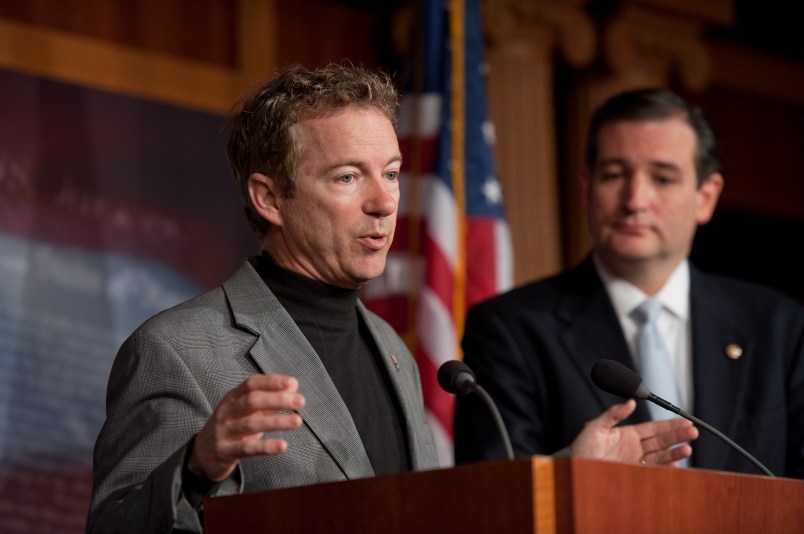WASHINGTON — The budget debate that kicked off on Capitol Hill this week forces difficult decisions on the four Republican senators eying a run for president in 2016.
Their votes could be critical to avoiding an embarrassing failure for the party, which needs 51 of its 54 senators to pass the budget resolution. It poses an early test for the four White House hopefuls by forcing them to reconcile the tough choices required to govern with their competing agendas and the lofty promises they’re making to voters at an early stage in the race.
A key battle line is between military hawks and fiscal hawks. The automatic “sequestration” cuts are set to return this year and Republicans will have to choose between boosting defense spending or keeping the deficit down.
Of the presidential hopefuls, Sen. Lindsey Graham (R-SC) and Sen. Marco Rubio (R-FL) have made clear they won’t support a budget without a boost to defense spending. Both are trying to corner the foreign-policy-hawk wing of the GOP. So Republican leaders have found a creative way to satisfy that demand: use a reserve fund known as “overseas contingency operations” — or OCO — to inflate the amount of money available to the Pentagon in the short-term.
The other two contenders, Sen. Ted Cruz (R-TX) and Sen. Rand Paul (R-KY), are wildcards who have been largely absent from the current budget debate. Both have voted against prior GOP budgets, complaining that they didn’t move policy far enough to the right. The current Senate budget is even less far-reaching than the budgets they deemed insufficiently conservative.
But they were in the minority then. Now the onus to govern is stronger, and Cruz and Paul risk bringing strong criticism on the GOP if their opposition scuttles the budget. And yet, backing a blueprint that bucks their longstanding demand for deeper spending cuts risks undermining the anti-establishment credentials that each is hoping to ride to the presidential nomination.
Cruz, who is on a national media blitz since announcing his presidential bid on Monday, is uncertain to even be present for the vote. Paul has been largely silent during the budget debate; his office didn’t return requests for comment.

Sen. Marco Rubio, R-Fla., right, speaks during a news conference on the violence in the Mideast on Capitol Hill in Washington, Thursday, July 24, 2014. Standing with Rubio is Sen. Lindsey Graham, R-S.C., left, and Sen. Richard Blumenthal, D-Conn., center. (AP Photo)
The vote-a-rama, expected to wrap up in the late hours of Friday night, will include a slew of amendments and, Republican leaders hope, end with the approval of the Senate GOP budget offered by Sen. Mike Enzi (R-WY).
It’s a dicey road ahead. Republicans can only afford to lose three votes lest they suffer the humiliation of having their own budget defeated less than three months after taking control of the Senate. GOP leaders also have to address the concerns of the two-dozen senators facing reelection in 2016, several in blue states. The upside for them is that the budget resolution is nonbinding and thereby gives them room to satisfy some messaging imperatives without having to face the full consequences of their ideas.
Rubio and neoconservative darling Sen. Tom Cotton (R-AR) have offered an amendment to the budget that raises defense spending.
“I believe defense spending is the most important obligation of the federal government,” Rubio said. “I promise you, a world where America is no longer the most capable fighting force on the planet is a world that is more chaotic and less safe.”
Meanwhile, Graham and Sen. Kelly Ayotte (R-NH) offered a competing amendment to also boost military spending, which narrowly passed the Budget Committee. Graham said that when the sequester cuts to defense spending were enacted in 2011, “ISIL did not exist as a major threat.”










